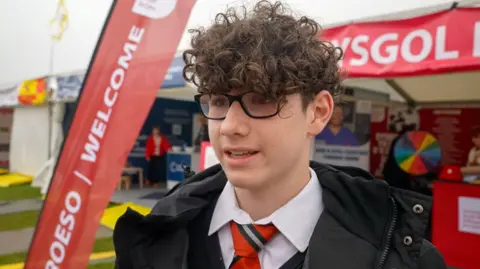Young people using English over Welsh on social media
 BBC
BBCYoung people's attitudes towards the Welsh language are "encouraging" but English is by far the main language used by teenagers on social media, a report has found.
A large majority of Welsh children communicate mainly through English on social media even when speaking to other Welsh-speakers, according to the report set to be released at the Urdd Eisteddfod later.
The survey of about 1,600 youngsters found "limited" use of Welsh by children outside of school, but added it was more likely to be spoken in activities like sport.
Responding to the report, Welsh Language Commissioner Efa Gruffudd Jones said it highlighted "significant challenges... [but] also identifies opportunities".
Cai Saunders, 16, who attends English medium secondary school Treorchy Comprehensive in Rhondda Cynon Taf, said he and his friends who are studying Welsh have a group chat where they practice before lessons and exams.
"Sometimes we share things on Instagram or Facebook to show friends and family, but my friends who study A-level have set up a group chat so that we can talk in Welsh."

Cerys, from Ysgol Gyfun Gwent Is Coed, near Newport, speaks Welsh with her family.
She said a lot of her friends went to English schools and used English outside of school because their family and parents "don't speak Welsh".
"If there are more places where they are able to speak Welsh, I think more would speak Welsh," she said.
Mathew Franklin from Ysgol Gyfun Llangefni on Anglesey said he usually mixed Welsh and English when talking with friends at school.
He said he liked to speak Welsh, adding: "I don't get a lot of time to speak [Welsh] with my friends."

Cari Lovelock from Anglesey said she thought it was "important" for the younger generation so use Welsh socially.
"We are the next generation who are going to promote the language and keep it alive so that we get things like the Eisteddfod and I think that is an important thing," she said.
Hari ap Llwyd Dafydd from Ysgol Gyfun Cwm Rhymni, Caerphilly county, said he spoke English with his friends because that is the home language for many of them.
Although he speaks Welsh at home, he said: "We don't see any entertainment in Welsh, they're all in English, so it's not easy to speak Welsh with friends."
'Positive' attitude to Welsh language
About 1,600 children and young people - most of them between the ages of 11 and 16 - took part in the research for the report to the Welsh Language Commissioner.
The report found the general use of Welsh by children and young people outside of school was "limited".
But children were more likely to use the language in sporting activities, especially with coaches and leaders, it said.
Attitudes towards the Welsh language were also generally "positive", especially among those who were fluent and had learnt the language at home.
But the report found there was very little use of Welsh on social media, with the majority using English "because it is easier and reaches a wider audience".
About 80% of those who responded to the questionnaire said they used English every time or usually to communicate online, even with other Welsh speakers.
But fluent speakers were more likely to communicate directly through the language, with half saying they usually texted in Welsh, or used both languages equally.

According to the Welsh Language Commissioner, the information gathered will help inform the commissioner's future work, as well as others.
"Children and young people are vital to the future of the Welsh language. This wide-ranging research offers us an insight into the use of Welsh by young people," said Ms Gruffudd Jones.
She said there was no doubt the reported highlighted "significant challenges" particularly in social media, but also identified opportunities.
Myfanwy Jones, director of Mentrau Iaith Cymru, a national organisation that supports a network of 22 local Welsh language initiatives, said there was a need to expand the opportunities to use Welsh outside of school.
"It is clear that there are a large number of respondents who do not use Welsh very often outside of school but are generally supportive of the Welsh language and wish to have more opportunities to use the language," she said.
She said the report showed it was "crucial" to offer young people opportunities to used the language naturally.
